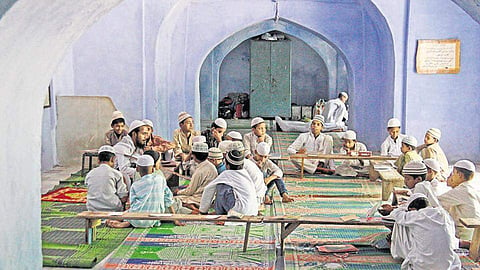

The National Commission for Protection of Child Rights (NCPCR) on Friday, January 20, issued notices to all the state chief secretaries to identify madrassas which are being attended by non-muslim students as well.
"We have received complaints from various places about non-Muslim students attending madrassas funded or recognized by the government. We have issued notices to all state chief secretaries to identify such madrassas and shift non-Muslim students from these madrassas to the schools," NCPCR Chief Priyank Kanoongo said, while talking to ANI.
"The Uttar Pradesh Madrassa Board had made an objectionable and silly statement that it will continue to admit non-Muslim students in madrassas. Hence, we have written to Special Secretary Minorities that giving Islamic education to non-Muslim students is a violation of Article 28(3) and asked them to reply within three days," he added, as per the ANI report.
Madrasas, as institutions, are primarily responsible for imparting religious education to children. They are of three types: "Recognised Madrassas", "Unrecognised Madrassas" and "Unmapped Madrassas", as stated in the report.
Uttar Pradesh Madrassa Education Council Chairman Iftikhar Ahmed Javed on January 7 urged the National Commission for Protection of Child Rights (NCPCR) to reconsider their letter, urging states and UTs to inspect the recognised madrassas admitting non-Muslim children.
"Non-Hindus also go to Sanskrit schools. The Child Protection Commission's letter has come to notice. I want to say that we are providing modern education to children under NCERT syllabus and only religious education is not being imparted in madrassas," Iftikhar Ahmed Javed said.
Replying to the child rights panel's letter, demanding an inquiry into Madrassas, and inducting non-Muslim students, Iftikhar said, "Non-Muslims are studying in madrassas and non-Hindu children are studying in Sanskrit schools. Children of every religion are also studying in missionary schools. Even though I myself studied at Banaras Hindu University (BHU), NCPCR should reconsider their letter."
Complaints received earlier
Earlier in December, the National Commission for Protection of Child Rights (NCPCR) wrote to the chief secretaries of all states and union territories and directed them to conduct a detailed inquiry of all recognised madrassas admitting non-Muslim children.
The NCPCR also recommended the chief secretaries admit all non-Muslim students in the said Madrassas to formal schools subsequent to the inquiry besides the mapping of all unmapped madrasas.
The letter undersigned by Chairperson-NCPCR Priyank Kanoongo had said based on various complaints received, "...it is noted that children belonging to Non-Muslim communities are attending Government funded/ Recognised Madrassas."
The Commission's letter said, "However, it is also learnt that those Madrassas which are funded by the Government or recognised by the Government are imparting both religious and to some extent formal education to children."
"Further, it is also learnt by the Commission that some State/UT Governments are providing them with scholarships too. This is a clear-cut violation and contravention of Article 28(3) of the Constitution of India which prohibits educational institutions from obligating children to take part in any religious instruction, without the consent of the parent," the letter added.
"It is pertinent to mention that the Constitution of India makes it an obligation of the state to provide free and compulsory education to all children without any discrimination or prejudice and ensure that children go to neighbourhood schools for availing formal education as per Section VI of the RTE Act, 2009," it said.
Inquiry to be conducted
The statutory body constituted under a Commission for Protection of Child Rights (CPCR) Act, 2005, aimed at protecting child rights, said, "Conduct a detailed inquiry of all Government Funded/Recognized Madrassas who are admitting Non- Muslim children in your State/UT.
"The inquiry should include physical verification of children attending such Madrassas. Subsequent to the inquiry, admit all such children in schools for availing formal education. It also ordered the undertaking of "Mapping of all Unmapped Madrassas in your State/UT and admit any/all children into Schools for availing formal education with immediate effect."
The Action Taken Report by the states and UTs were to be shared with the Commission within 30 days from December 8, 2022.
The NCPCR letter referred to the Constitution (86th Amendment) Act, 2002 wherein Article 21- A, mentions providing free and compulsory education for all children in the age group of six to fourteen years as a Fundamental Right in such a manner as the state may, by law, determine.
"Consequent to the 86th Amendment in the Constitution of India, for implementation of the 'Right of Children to Free and Compulsory Education' for children in the age group of six to 14 years, the RTE Act was passed by the Parliament of India in August 2009. The National Commission for Protection of Child Rights (NCPCR) has been mandated to monitor the provisions and entitlements contained in the RTE Act, 2009," it added.
